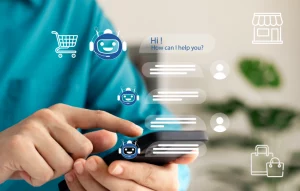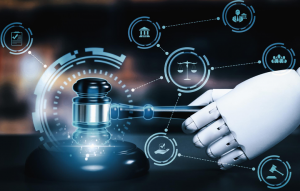The healthcare industry has been embracing AI technology for a long time to manage its back office and administrative work. Whether it is to book an appointment with a doctor or schedule surgeries in an OT room based on its availability.
Let generative AI take you into a new era. The potential of this technology transcends all sectors. The healthcare industry can also greatly benefit from generative AI.
Close collaboration between AI experts, medical professionals and regulatory bodies can harness the full potential of generative AI in healthcare while ensuring patient safety and privacy.
Challenges in adopting generative AI in healthcare
The applications of generative artificial intelligence in healthcare can present unique challenges and hurdles. Addressing these challenges requires a multidisciplinary approach involving experts from AI research, healthcare, law, ethics and policymaking. Open communication, collaboration and a commitment to patient safety and the ethical use of AI are essential for successfully integrating generative AI into the healthcare industry. Let’s have a look at the challenges and how we may overcome them with the use of generative AI in healthcare:
1. Data privacy and security
Techniques like federated learning, where AI models are trained locally on distributed data without sharing sensitive information, can be used. Employ encryption and secure data sharing protocols.
2. Data quality and bias
A regular datasets audit is required for biases. Develop algorithms to mitigate bias during training. Use explainable AI techniques to understand how models arrive at decisions.
3. Interpretable AI
Techniques such as attention mechanisms and visualization tools to provide insights into model decision-making by highlighting relevant features in medical images or patient data.
4. Regulatory compliance
Working closely with regulatory bodies to develop guidelines for evaluating and approving AI-driven healthcare solutions. Collaborate with legal experts to ensure that AI systems meet regulatory standards and can be legally integrated into clinical practice.
5. Integration with clinical workflows
Involve healthcare professionals in the design and development of AI tools to ensure they fit seamlessly into existing workflows. Provide training and support to help professionals adapt to new technologies.
6. Lack of standardization
Advocate for standardized data formats and interoperability protocols within the healthcare industry. Collaborate with standardization organizations to develop guidelines for data collection, sharing and analysis.
7. Ethical considerations
Establish ethical frameworks for AI use in healthcare, involving input from medical ethicists, patients and healthcare professionals. Ensure transparency in AI decision-making and involve patients in decisions about AI-driven care.
8. Clinical validation
Conduct rigorous clinical trials and validations for AI models before their deployment. Collaborate with healthcare institutions to ensure that AI models are tested in real-world scenarios and compared against existing gold standards.
9. Continuous learning and adaptation
Implement mechanisms for continuous learning and model updates to incorporate new medical knowledge and evolving best practices. Design AI systems that can learn from new data while maintaining their integrity.
10. Legal liability
Collaborate with legal experts to establish clear liability frameworks for AI-generated decisions. Develop guidelines that allocate responsibility between AI systems and healthcare professionals in different scenarios.
The successful implementation of generative AI in the healthcare industry will require a coordinated effort from healthcare professionals, researchers and developers. By working together, we can overcome the challenges and realize the potential of this powerful technology.
Use cases of generative AI in healthcare
Generative AI’s ability to create, simulate and analyze has the potential to revolutionize healthcare. The applications of this technology in healthcare are poised to deliver unprecedented levels of precision, efficiency and patient-centered care. Let’s look at a few use cases of generative AI in healthcare where it can be leveraged the most.
1. Assistance to patients in their native language: Generative AI can be used to translate medical records, discharge summaries and other patient-facing documents into the patient’s native language. This can help patients understand their care and treatment plans. For example, generative AI can be used to translate a discharge summary from English to Spanish in real time, so that the patient can understand the instructions and recommendations before they leave the hospital.
2. Create checklists for individual patients based on their medical records: Generative AI can be used to create personalized checklists for each patient based on their medical record. This can ensure that doctors and nurses perform all the necessary checkups during a physician’s round, such as checking vital signs, reviewing medications and asking about pain levels. For example, generative AI can be used to create a checklist for a patient with diabetes that includes tasks such as checking blood sugar levels, reviewing insulin doses and educating the patient about diet and exercise.
3. Help generative aftercare summary at the time of patient discharge: Patients aftercare summaries can be generated at the time of discharge. This can help patients have a clear understanding of their care plan and what they need to do to follow up after they leave the hospital. For example, an aftercare summary can be created using generative AI for a patient with pneumonia that includes instructions on how to take their medications, how to care for their incision and when to follow up with their doctor.
4. Create procurement orders based on consumption records: This can help ensure that hospitals and other healthcare organizations have the necessary supplies on hand to provide care to patients. For example, generative AI can be used to create a procurement order for syringes based on the number of syringes that have been used in the past month.
5. Generate vendor communication drafts: Generative AI can be used to generate vendor communication drafts, such as purchase orders, invoices and shipping confirmations. This can help save time and improve the accuracy of communication between healthcare organizations and vendors. For example, generative AI can be used to generate a purchase order for syringes that includes the correct quantity, price and shipping information.
Real-life uses of generative AI in healthcare
Many healthcare institutions have already begun to realize the potential of generative AI in healthcare and have started to incorporate this emerging technology to streamline tasks.
- Insilico Medicine: This company is using generative AI to design new drugs for cancer and other diseases.
- Atomwise: This company is using generative AI to discover new drugs for infectious diseases.
- Enlitic: This company is using generative AI to improve the accuracy of medical imaging.
Benefits of using generative AI in healthcare
Generative AI is tapping into new possibilities that hold the potential to transform healthcare. The integration of Generative AI has emerged as a beacon of innovation, promising many transformative benefits.
- Generative AI enhances efficiency, reducing administrative tasks and operational costs.
- AI improves diagnostic accuracy and treatment recommendations.
- Personalized care for patients.
- AI accelerates drug discovery, expediting the development of new medications.
- Data-driven insights offer informed decision-making and enhanced patient care.
- AI-driven patient engagement boosts satisfaction and adherence.
- Administrative tasks are streamlined, from scheduling to billing.
- Telemedicine and remote monitoring expand access to healthcare.
- AI ensures compliance and quality control, reducing errors.
- AI aids research by analyzing complex medical data.
- Patient data security is strengthened through encryption and authentication.
Embrace the future of healthcare with generative AI
Generative AI has made significant strides in the healthcare industry, with the potential to revolutionize medical research, diagnostics and patient care. Its ability to generate synthetic data, assist in drug discovery and enhance medical imaging could redefine the landscape of healthcare, leading to more accurate diagnoses and personalized treatment plans.
Our generative AI consulting team is ready to collaborate with you on innovative solutions that can drive progress and make a lasting impact in your field.









